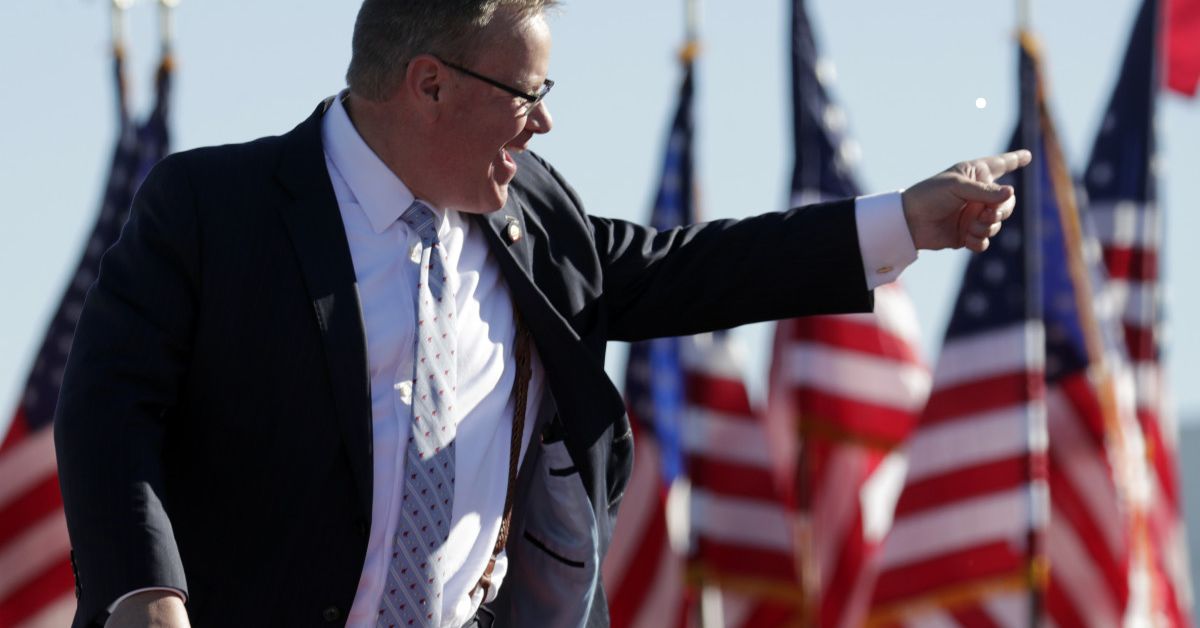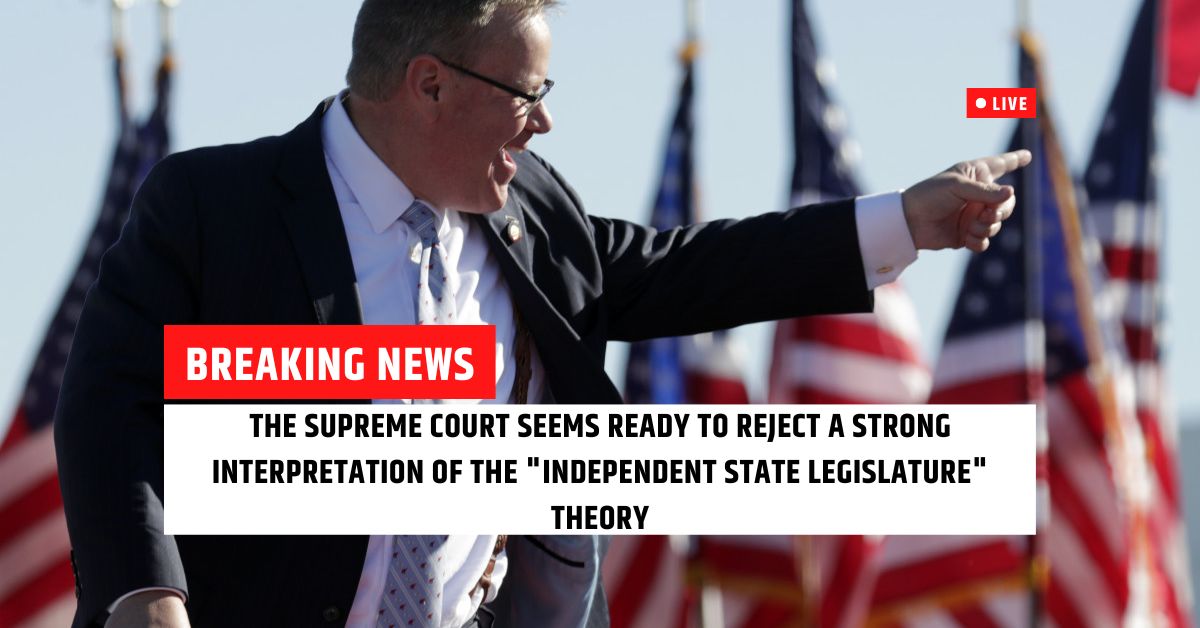The Supreme Court Seems Ready To Reject A Strong Interpretation Of The “Independent State Legislature” Theory.
Wednesday, the Supreme Court had a hard time agreeing on a legal theory that could take away the ability of state courts to review election laws passed by legislatures. However, a key group of justices seemed likely to vote against the strongest version of this theory, which could lead to big changes in how states run elections.
Moore v. Harper is a case about how North Carolina’s districts are drawn. There, the state Supreme Court threw out the maps made by the GOP-controlled Legislature because they were illegally rigged to favor one party. Instead, the court made new maps that will be used for the 2022 election.
Republican lawmakers asked the U.S. Supreme Court to throw out the court-drawn maps. They did this by bringing up the “independent state legislature” theory, which says that a clause in the U.S. Constitution can be interpreted in a way that leaves little or no room for state courts to review election laws. At Wednesday’s oral arguments, all eyes were on Chief Justice John Roberts, Associate Justices Amy Coney Barrett, and Brett Kavanaugh, three of the six conservative justices on the Supreme Court.
Most likely, whichever decision is made will come down to those three justices. During oral arguments, the three liberals on the court were very against the theory. On the other hand, the three other conservatives have shown support for a strong version of the theory, both in past writings and during oral arguments on Wednesday.
That meant that Roberts, Barrett, and Kavanaugh were the only justices who could likely hold the court together. As in other arguments they’ve had recently, they seemed eager to disprove the idea that they’re trying to push for strict legal interpretations that could change decades or even centuries of standard practice in American elections. Roberts’s questions to David Thompson, who was speaking for the Republican legislators, showed that he didn’t like the idea of an independent state legislature.
“Giving the governor the power to veto what the legislature does significantly weakens the argument that it can do whatever it wants,” Roberts said, citing a Supreme Court case from the 1930s that said the U.S. Constitution didn’t prevent governors from vetoing a congressional map passed by legislatures.

The questions that Kavanaugh and Barrett asked Thompson were not as revealing as those that Roberts asked. But Kavanaugh seemed to say that the North Carolina lawmakers’ version of the independent state legislature theory was going too far. He said that North Carolina was trying to go further than what then-Chief Justice William Rehnquist did in the Bush v. Gore case in 2000. This is where the idea that state courts have gone too far and could be stopped came from.
Kavanaugh also brought up a brief from the Conference of Chief Justices, which is a group of the top judges from each state. He asked how their writing about the history of state courts applying state constitutions to federal elections fits in with the theory that each state has its legislature. Barrett, on the other hand, seemed uncertain about Thompson’s argument at times, pointing out that state constitutions could be changed.
But later, Roberts’ questions to Neal Katyal, who represented the groups that challenged the initial legislatively drawn maps, showed that some of the court’s swing conservative justices could still possibly rule in favor of the GOP lawmakers even if they didn’t agree with the strongest version of the independent state legislature theory. Roberts seemed to be looking for a way to limit the power of state courts, especially when it came to decisions that could be based on broad constitutional provisions.
He asked Katyal, “Do you think the phrase “fair and free elections” give standards and guidelines?” Katyal said, “Yes.” Roberts was also unhappy with the North Carolina Supreme Court’s decision that it could use that vaguely worded promise to adopt a precise mathematical formula called an “efficiency gap” to stop gerrymandering.
And both Kavanaugh and Barrett asked Katyal about the Rehnquist concurrence. Katyal said that the federal judiciary should only step in to second-guess a state court’s ruling on its constitution if the decision reached a “sky-high” standard of ignoring established legal principles.
The liberal judges on the court were very harsh on Thompson. At one point, Justice Sonia Sotomayor said that the GOP lawmakers were trying to prove their point by “rewriting the history” of early state constitutions. She also told Thompson straight out that she didn’t understand one of his points. Justice Elena Kagan emphasized how big an effect it would have if state constitutions didn’t put limits on what the legislatures could do. She said, “This is a theory with big effects.”
Justice Ketanji Brown Jackson said that the part of the U.S. Constitution that says elections are run by state legislatures only makes sense in light of the decisions those states have made to set up legislative bodies and define their powers, usually in a state constitution. Jackson said, “What I don’t understand is how you can leave the state constitution out of the picture when it gives the state legislature the power to make laws.”
The Supreme Court Seems Ready To Reject A Strong Interpretation Of The “Independent State Legislature” Theory
Meanwhile, the three more conservative justices on the court—Samuel Alito, Neil Gorsuch, and Clarence Thomas—seemed more likely to agree with a stronger interpretation of the independent state legislature theory. But even among these conservatives, there was some doubt about the Republican legislators’ arguments.
They wanted a reading of the theory that would take away almost all of the power of state courts over congressional elections. On top of that, Thompson had to convince two of the three other conservatives, who didn’t seem to agree with the bigger picture, to join him.
“A lot has been said about what this decision will mean for democracy. Do you think it’s good for democracy to move the political debate over districting from the legislature to the supreme courts, which are elected and where candidates are allowed by law to campaign? At one point, Alito asked.
The oral arguments on Wednesday will affect a lot more than just North Carolina’s congressional lines, which have been changed several times in the last ten years. If the court takes the independent state legislature theory seriously, it could give state legislatures a lot more power to set the rules for elections. A maximalist version of the theory would stop state courts from getting involved in disputes about things like voter ID and last-minute changes to polling places. It could even put at risk voter-approved referendums that create independent redistricting commissions that take over traditional legislative powers.
Some people would even try to use the U.S. Constitution to stop governors from doing what they usually do. To get the Supreme Court to ignore governors, Roberts said, the 90-year-old Supreme Court precedent would have to be overturned. This may be why Thompson didn’t push for this on Wednesday.
There are still a lot of unanswered questions about how, if at all, Wednesday’s case could change the rules for choosing presidential electors. Some of the most passionate supporters of the theory have mentioned connections to presidential elections in briefs, but many legal experts, including those who disagree with the independent state legislature theory, don’t think this case will have many effects on presidential elections.
During oral arguments on Wednesday, presidential electors were not brought up directly. However, Kagan briefly mentioned that the theory supported the idea that legislatures unhappy with the outcome of an election could step in and declare the result.
This is something that supporters of then-President Donald Trump were pushing state legislatures to do in 2020 when Trump was trying to steal the election from Joe Biden by making unproven claims of fraud. “It could give the legislatures a way to get involved in certifying elections and figuring out the results,” Kagan said.
Solicitor General Elizabeth Prelogar, who worked for the Biden administration, also asked the justices to let state constitutional provisions continue to be enforced. She agreed with Kagan that it was risky to change policies that had been in place for a long time. “That would make things worse,” Prelogar said.
The Supreme Court heard the Moore case this term. It is the second important election law case the court has heard this term. Early in October, the Supreme Court heard arguments in another redistricting case. In this case, Alabama argued for a “race-neutral” reading of the federal Voting Rights Act, the landmark civil rights law that has led to more minority representation in politics.
The court didn’t seem likely to agree with that interpretation, but it did seem likely to change the legal test used to decide if minority communities’ voting power is being diluted, which could make it harder to bring challenges. Most likely, decisions will be made in both cases by the end of June.
Leave your comments if you liked the article. Also, keep checking back with us here at Journalistpr.com. for updates.

Leave a Reply